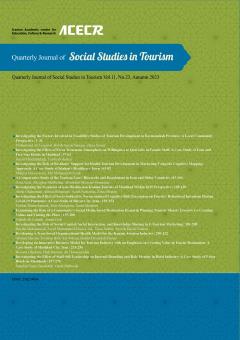A Comparative Study of the Tourism Laws’ Hierarchy and Regulations in Iran and Other Countries
Subject Areas :Ozra Azizi 1 , Ali Asghar Shalbafian 2 , aboutaleb ghasemi 3
1 - دانشگاه علامه طباطبایی
2 - samnan univercity
3 - kharazmi univercity
Keywords: Comparative Law, Comparative Study, Law, Tourism,
Abstract :
Laws and regulations are among the most important executive and monitoring tools that help governments fulfill their role in setting tourism development policies, and assessing, controlling, and regulating the relations among tourism stakeholders. Therefore, this study sought to examine the structure and titles of tourism laws in China, France, Malaysia, and Turkey and compare them with the relevant laws and regulations exercised in Iran to identify the status of the key issues in the respective hierarchical system of those countries' laws and regulations. To this end, the study followed the comparative law methodology to analyze the content of the laws and regulations mentioned above using a text-based approach. According to the findings of the study, many of the issues that are turned into law in the countries investigated in the current study occupy a lower position in the hierarchy of Iran’s Tourism Laws and Regulations System, being referred to in terms of either by-laws or executive instructions. Moreover, some issues have not been addressed at any level. Therefore, it can be argued that compared to the countries studied in this research, Iran’s tourism sector does not enjoy a proper status in Iran’s legal system. In other words, the current laws and regulations enforced in Iran lack many key tourism-related issues that could help regulate the relations between various relevant stakeholders, prevent unnecessary interventions by different bodies and organizations, reduce the number of lawsuits among the suppliers of tourism services and tourists, or help coordinate the relevant actors in achieving the intended goals. Therefore, the tourism sector needs a centralized, transparent, and comprehensive law.
بابایی فینی، ام السلمه. (1394). «مقایسه قوانین و مقررات گردشگری جمهوری اسلامی ایران با کشورهای توسعهیافته». برنامهریزی و توسعه گردشگری، 14، 62-44.
رحیم پور، علی. (1393). مطالعات تطبیقی سیاستها، قوانین و مقررات سرمایهگذاری گردشگری ایران با ترکیه و مالزی، همایش بینالمللی علمی- راهبردی توسعه گردشگری جمهوری اسلامی ایران، چالشها و چشماندازها.
شیروی، عبدالحسین. (1391). حقوق تطبیقی. چاپ دهم. تهران: سمت.
محسنی، الهه. (1398). «روششناسی حقوق تطبیقی». مطالعات حقوق تطبیقی، 10 (2): 717-695.
مسعود انصاری، محمدعلی طاهری. (1388). دانشنامه حقوق خصوصی. تهران: جنگل، جاودانه.
Abaydeldinov. Y, Kala. N (2016) International Legal Aspects of Tourism Activity: International Treaties Analysis, Journal of Advanced Research in Law and Economics VII, 4:18, 714-720.
Act for the Development of Tourism, Laws & Regulations Database of the Republic of China, Announced Date: 1969-07-30, Amended Date: 2019-06-19.
France Tourism Code, December 21, 2004, updated: July 01, 2021.
Jenkins, J.M, Mkono, M (2015) Sustainable tourism legislation and regulation In Hall & others The Routledge Handbook of Tourism and Sustainability, Oxon, United Kingdom, Routledge.
Laws of Malaysia, Tourism Industry Act 1992, all amendments up to 1 January 2006.
Moghadam. K. A & others (2019) Identifying the Jurisprudential and Legal Problems of NonMuslim Tourists in Iran and Prioritizing Them Using Multiple Criteria Decision Making (AHP), Journal of Tourism & Hospitality Research Islamic Azad University, Garmsar Branch, 7, 1, 41-48.
Reid, Sacha, et al (2010) Legal basis for state and territory tourism planning, CRC for Sustainable Tourism Pty Ltd, Australia.
Turkey Tourism Encouragmrnt Law, Law No: 2634 Date of Passage: 12 March 1982.


